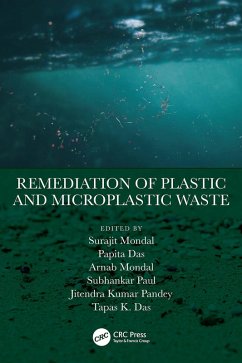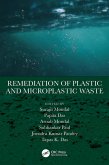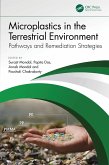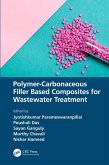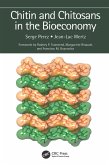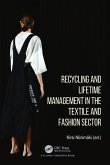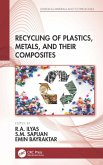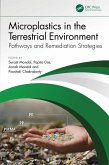Remediation of Plastic and Microplastic Waste (eBook, PDF)
Redaktion: Mondal, Surajit; Das, Tapas K.; Pandey, Jitendra Kumar; Paul, Subhankar; Mondal, Arnab; Das, Papita
51,95 €
51,95 €
inkl. MwSt.
Sofort per Download lieferbar

26 °P sammeln
51,95 €
Als Download kaufen

51,95 €
inkl. MwSt.
Sofort per Download lieferbar

26 °P sammeln
Jetzt verschenken
Alle Infos zum eBook verschenken
51,95 €
inkl. MwSt.
Sofort per Download lieferbar
Alle Infos zum eBook verschenken

26 °P sammeln
Remediation of Plastic and Microplastic Waste (eBook, PDF)
Redaktion: Mondal, Surajit; Das, Tapas K.; Pandey, Jitendra Kumar; Paul, Subhankar; Mondal, Arnab; Das, Papita
- Format: PDF
- Merkliste
- Auf die Merkliste
- Bewerten Bewerten
- Teilen
- Produkt teilen
- Produkterinnerung
- Produkterinnerung

Bitte loggen Sie sich zunächst in Ihr Kundenkonto ein oder registrieren Sie sich bei
bücher.de, um das eBook-Abo tolino select nutzen zu können.
Hier können Sie sich einloggen
Hier können Sie sich einloggen
Sie sind bereits eingeloggt. Klicken Sie auf 2. tolino select Abo, um fortzufahren.

Bitte loggen Sie sich zunächst in Ihr Kundenkonto ein oder registrieren Sie sich bei bücher.de, um das eBook-Abo tolino select nutzen zu können.
This book provides recent developments and advancements to manage plastic wastes and associated challenges with it. It primarily addresses the issues of plastics that might affect the lifeform in the long run and it's prevention using suitable approaches.
- Geräte: PC
- mit Kopierschutz
- eBook Hilfe
Andere Kunden interessierten sich auch für
![Remediation of Plastic and Microplastic Waste (eBook, ePUB) Remediation of Plastic and Microplastic Waste (eBook, ePUB)]() Remediation of Plastic and Microplastic Waste (eBook, ePUB)51,95 €
Remediation of Plastic and Microplastic Waste (eBook, ePUB)51,95 €![Microplastics in the Terrestrial Environment (eBook, PDF) Microplastics in the Terrestrial Environment (eBook, PDF)]() Microplastics in the Terrestrial Environment (eBook, PDF)52,95 €
Microplastics in the Terrestrial Environment (eBook, PDF)52,95 €![Polymer-Carbonaceous Filler Based Composites for Wastewater Treatment (eBook, PDF) Polymer-Carbonaceous Filler Based Composites for Wastewater Treatment (eBook, PDF)]() Polymer-Carbonaceous Filler Based Composites for Wastewater Treatment (eBook, PDF)59,95 €
Polymer-Carbonaceous Filler Based Composites for Wastewater Treatment (eBook, PDF)59,95 €![Chitin and Chitosans in the Bioeconomy (eBook, PDF) Chitin and Chitosans in the Bioeconomy (eBook, PDF)]() Serge PerezChitin and Chitosans in the Bioeconomy (eBook, PDF)48,95 €
Serge PerezChitin and Chitosans in the Bioeconomy (eBook, PDF)48,95 €![Recycling and Lifetime Management in the Textile and Fashion Sector (eBook, PDF) Recycling and Lifetime Management in the Textile and Fashion Sector (eBook, PDF)]() Recycling and Lifetime Management in the Textile and Fashion Sector (eBook, PDF)51,95 €
Recycling and Lifetime Management in the Textile and Fashion Sector (eBook, PDF)51,95 €![Recycling of Plastics, Metals, and Their Composites (eBook, PDF) Recycling of Plastics, Metals, and Their Composites (eBook, PDF)]() Recycling of Plastics, Metals, and Their Composites (eBook, PDF)53,95 €
Recycling of Plastics, Metals, and Their Composites (eBook, PDF)53,95 €![Microplastics in the Terrestrial Environment (eBook, ePUB) Microplastics in the Terrestrial Environment (eBook, ePUB)]() Microplastics in the Terrestrial Environment (eBook, ePUB)52,95 €
Microplastics in the Terrestrial Environment (eBook, ePUB)52,95 €-
-
-
This book provides recent developments and advancements to manage plastic wastes and associated challenges with it. It primarily addresses the issues of plastics that might affect the lifeform in the long run and it's prevention using suitable approaches.
Dieser Download kann aus rechtlichen Gründen nur mit Rechnungsadresse in A, B, BG, CY, CZ, D, DK, EW, E, FIN, F, GR, HR, H, IRL, I, LT, L, LR, M, NL, PL, P, R, S, SLO, SK ausgeliefert werden.
Produktdetails
- Produktdetails
- Verlag: Taylor & Francis eBooks
- Seitenzahl: 300
- Erscheinungstermin: 14. Februar 2024
- Englisch
- ISBN-13: 9781003848400
- Artikelnr.: 69628680
- Verlag: Taylor & Francis eBooks
- Seitenzahl: 300
- Erscheinungstermin: 14. Februar 2024
- Englisch
- ISBN-13: 9781003848400
- Artikelnr.: 69628680
- Herstellerkennzeichnung Die Herstellerinformationen sind derzeit nicht verfügbar.
Dr. Surajit Mondal completed his masters in Energy Systems and Ph.D. on the Renewable Energy domain in 2020. Currently, he is teaching in University of Petroleum and Energy Studies to UG and PG students. He has published more than 32 international research and review articles as an author/co-author. He has published 42 patents and granted eight patents against his name. He has completed two DST- (Govt. of India) funded projects in the field of Energy Systems/Sustainability. Professor Papita Das earned her Ph.D. in Chemical Engineering from Jadavpur University, India. She is Professor, Department of Chemical Engineering, and Director, School of Advanced Studies in Industrial Pollution Control Engineering, Jadavpur University, Kolkata, India. She is known for her work in water treatment using different novel adsorbents materials. She is also working on biomass-based energy production and polymeric-nanocomposite synthesis and its degradation. She has published more than 175 international journal research articles and reviews and more than 50 book chapters in various SCI and Scopus-indexed journals. She is also ranked in World Ranking of the top 2% Scientists (2020, 2021 and 2022), published by Stanford University, which represents the top 2% the most cited scientists in various discipline. Ranked 432 among 53,348 researchers in the field of Chemical Engineering (2022) based on career-long impact and 171 for the single year 2021 among single year citation of 2021, she ranked 614 among 55,697 researchers in Chemical Engineering (2020) and 534 among 66,189 researchers in the field of Chemical Engineering (2021) based on career-long impact and ranked 217 for single-year 2020 discipline. She has also guided ten Ph.D. students (Completed), two (submitted) and seven (ongoing). She was Editor of two books published by Elsevier and Springer, and she is Editorial Board Member, Editor-in-Chief and Associate Editor of various international journals. She had completed 17 projects funded by govt. agencies and industries. Mr. Arnab Mondal is currently working as a research project fellow in the field of environmental engineering from CSIR National Environmental Engineering Research Institute (NEERI), Nagpur. He has completed his master's from the Institute of Environment and Sustainable Development (IESD), Banaras Hindu University, Varanasi. He has published several research articles in international journals. He has also been associated with several government-funded projects like Dept. of Water Resources (Ministry of Jal Shakti) and the Ministry of Earth Science. Professor Subhankar Paul did his Ph.D. in biotechnology from Indian Institute of Technology, Delhi, India. He is basically a chemical engineer and currently teaching in the Department of Biotechnology & Medical Engineering, National Institute of Technology Rourkela, India. He has published more than 70 international research and review articles as an author or co-author. He has collaborated in many foreign laboratories, including University of Sydney (Australia), Indiana University (U.S.A), Yamagata University and University of Tokyo (Japan). Presently, his research is focused on nanotechnology in environmental remediation. He has already guided many Ph.D. and master's students. Professor Jitendra Kumar Pandey did his Ph.D. in polymer chemistry at National Chemical Laboratory, Pune. He is known for his exemplary work in the field of water treatment, water purification, alternate energy, biosensors, nano absorbent, etc. He has published more than 120 reviews and research articles, has eight patents and has published four books as well. He has completed more than seven government-funded projects of 3+ Crore INR with national and international collaborations on aligned areas. He has been honoured as a prestigious NASI fellow. Professor Tapas K. Das holds a B.S. in chemical engineering from Jadavpur University in Kolkata, India, and Ph.D. from Bradford University, U.K. Tapas was a postdoctoral fellow at London's Imperial College of Science and Technology and a visiting scientist at Princeton University. Tapas has been teaching in the School of Engineering at Saint Martin's University since fall 2005. He has wide practical and theoretical experience in various areas, including air toxics and aerosols, advanced industrial wastewater treatment for water reuse, solid waste management and combustion, profitable process pollution prevention, reuse, recycle, redesign, environmental process intensification, circular economy, life cycle process or product design as a tool for innovation, industrial ecology and eco-industrial park, sustainable engineering, and sustainability. Tapas is a registered professional engineer (PE) in the states of Washington and Wisconsin. Tapas is a fellow member of American Institute of Chemical Engineers and Indian Chemical Society. Tapas is the author of two books - Industrial Environmental Management: Engineering, and Science and Policy (John Wiley & Sons, 2020, 1 ed.) and Toward Zero Discharge: Innovative Methodology and Technologies for Process Pollution Prevention (John Wiley & Sons, 2005) - as well as 16 book chapters and 80 publications.
1 Efficient Microplastic Remediation through Best Possible Strategies: A Review; 2 Microplastic Abundance in the Indian Environs: A Review; 3 Toxic Effect of Food-Borne Microplastics on Human Health; 4 Microplastics in the Atmosphere; 5 Microplastics in the Atmosphere: Identification, Sources and Transport Pathways; 6 Microplastic in the Marine Environment; 7 Edible Cutlery: A Tenable Solution to the Plastic Menace, Bolstering the Global Economy; 8 Bioengineering Solutions for Microplastic Pollution: Leveraging Microbial Assistance; 9 Scenario of Microplastics Waste in the Ecosystem: Strategies Toward Monitoring and Management; 10 Risk and Remediation of Microplastic Pollution in Marine Life; 11 Plastic Degradation Using Chemical/Solar/Biodegradation; 12 Fate of Micro/Nano Plastic Pollutants in the Marine Ecosystem; 13 The Fate of Micro/Nano Plastic Pollutants in the Natural Environment; 14 Green Remediation of Microplastics Using Bionanomaterials; 15 Emerging Applications of Magnetic Nanomaterials in the Remediation of Microplastics from the Aquatic Environment
1 Efficient Microplastic Remediation through Best Possible Strategies: A Review; 2 Microplastic Abundance in the Indian Environs: A Review; 3 Toxic Effect of Food-Borne Microplastics on Human Health; 4 Microplastics in the Atmosphere; 5 Microplastics in the Atmosphere: Identification, Sources and Transport Pathways; 6 Microplastic in the Marine Environment; 7 Edible Cutlery: A Tenable Solution to the Plastic Menace, Bolstering the Global Economy; 8 Bioengineering Solutions for Microplastic Pollution: Leveraging Microbial Assistance; 9 Scenario of Microplastics Waste in the Ecosystem: Strategies Toward Monitoring and Management; 10 Risk and Remediation of Microplastic Pollution in Marine Life; 11 Plastic Degradation Using Chemical/Solar/Biodegradation; 12 Fate of Micro/Nano Plastic Pollutants in the Marine Ecosystem; 13 The Fate of Micro/Nano Plastic Pollutants in the Natural Environment; 14 Green Remediation of Microplastics Using Bionanomaterials; 15 Emerging Applications of Magnetic Nanomaterials in the Remediation of Microplastics from the Aquatic Environment
